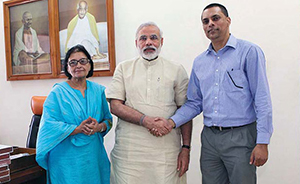An Agenda For Change
I recall the visit by C.F. Andrews, a well-known confidante of Mahatma Gandhi who visited the Caribbean in the early 20th century to look at the conditions of the Indian indentured labourers.
This was the first intervention of the then Indian Government in these parts.
Today, we are at the beginning of the 21st century, are faced with a similar exercise, even though the rationale might be different. Now is the time to record our progress and also to chart a new paradigm in relationships between Trinidad and Tobago, the Caribbean and India.
Indo Trinidadians since their entry on May 30, 1845 have arrived and have continued to make an indelible, constructive and critical support to the socio-economic, cultural and political development of this twin-island nation. This they have done selflessly and they will continue to do so into infinity.
The relationship between India and Trinidad and Tobago has shifted from a mere manifestation of cultural and religious ties to the Indian heritage of a large proportion of our island’s population, to a business relationship in real economic terms premised on business pacts.
Evidence of this has been seen in recent investments which, although small, have been significant in steel, paints, banking and technical assistance in several areas of technology and agriculture. This marks the new conduct of economic diplomacy that characterizes the Indian approach to the Caribbean. The dynamics of the new global environment have enabled our two countries to overcome the many miles that separate us and realize several new opportunities for deepening our relationships.
Following the recommendations of the International Conference of People of Indian Origin held in New Delhi, which I attended as Trinidad and Tobago’s representative, in February 2000, the Government of India established a High Level Committee to find ways and means of forging a mutually-beneficial relationship between the Indian Diaspora which amount to over 27 million people scattered across the globe, and India. The Committee was expected to outline concrete steps that need to be undertaken by the Government of India to facilitate and strengthen interaction of the Indian Diaspora with the country of their origin, especially their participation in India’s economic investments and technology transfers.











Comments.